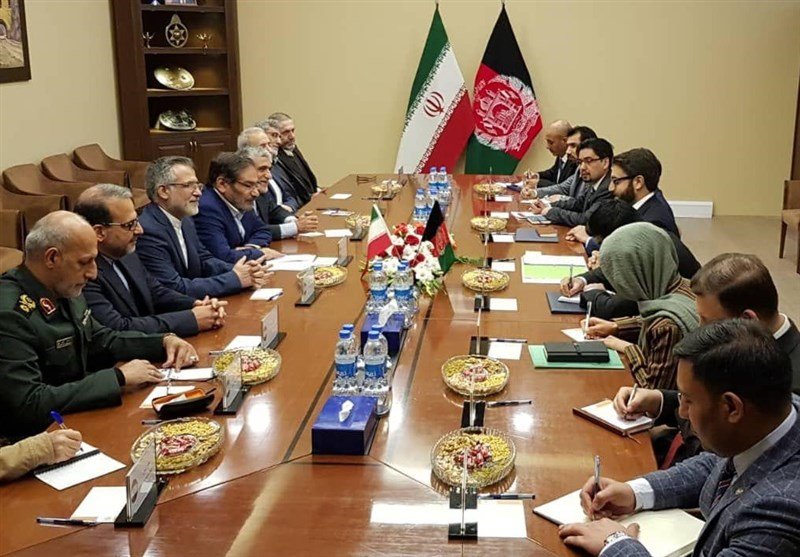Iran says has held talks with Taliban with knowledge of Afghan government

TEHRAN – Tehran has been holding talks with the Taliban with the knowledge of the Afghan government, Supreme National Security Council Secretary Ali Shamkhani said on Wednesday during a visit to Kabul.
The talks were held “to help curb the security problems in Afghanistan,” Shamkhani told Hamdullah Mohib, the Afghan president’s national security advisor.
“All contacts and talks with the Taliban group have been with the knowledge of Afghanistan's government and this process will continue,” the top Iranian security official underlined as he led a high-ranking Iranian security, military and political team to Kabul.
The news of Iran’s talks came a few days after talks between U.S. and Taliban officials over proposals for a ceasefire in Afghanistan, which neighbors Iran to the east with a long border, and a future withdrawal of foreign troops ahead of possible peace negotiations.
Addressing the Geneva Conference on Afghanistan on November 28, Iranian Foreign Minister Mohammad Javad Zarif called on the international community to facilitate “inclusive” dialogue between the Taliban and the Afghan government in a bid to restore peace to the war-torn country.
The United States led an invasion of Afghanistan in 2001. The invasion toppled a Taliban government that ruled over much of the country at the time; and while U.S.-led forces continue to occupy Afghanistan, they have failed to restore security.
Zarif, who in a previous capacity famously helped with the establishment of a post-invasion government in Afghanistan in the Bonn conference in 2001, said in the Geneva conference that there was no military solution to Afghanistan and that the time had come for national reconciliation.
‘Need for constant consultation’
Elsewhere in his remarks, Shamkhani emphasized the need to establish “mechanisms based on constant consultations” and “the active participation of regional countries in security processes” to guarantee sustainable stability and growth for regional nations.
Shamkhani also hailed the constructive agreements arrived at during a one-day security conference among Iranian, Russian, Chinese, Indian, and Afghan security chiefs and advisers in Tehran in September. The security chief voiced Iran’s support for holding the summit’s next edition in Afghanistan.
Shamkhani also described the threat of the spread of the Takfiri terrorist group of Daesh in Afghanistan as “serious.” He called for practical measures to stop that from happening.
‘Pillar of security’
Mohib, for his part, said the Islamic Republic had always been “one of the main pillars of security in the region.”
“The cooperation of the two countries will undoubtedly be very effectual in resolving Afghanistan’s current security problems,” he said.
U.S. officials said last Thursday that President Donald Trump had ordered a withdrawal of nearly half of the American forces stationed in Afghanistan, although the U.S. commander in Afghanistan later said no order had been officially received to begin such a withdrawal.
Shamkhani meets Afghan president and
Later the day, Shamkhani met Afghan President Ashraf Ghani and Chief Executive Abdullah Abdullah.
In his meeting with Ghani, Shamkhani said Iran is ready to enhance military and defense cooperation with Afghanistan.
He said Iran is prepared to promote defense, military and security cooperation with Afghanistan, which he described as a friend and brother.
The withdrawal of U.S. forces provides a golden opportunity for Afghanistan to strengthen its defense and military capabilities by relying on its own potential, the Iranian official said, adding that the U.S. presence in the region has resulted in nothing but wars and insecurity.
Stressing the need for joint efforts to ensure security of the Iran-Afghanistan border and fight against drug traffickers and terrorists, Shamkhani said, “In an organized move, the enemies of regional security and calm seek to make the common border insecure in order to transfer the defeated elements of Daesh to Afghanistan and support the spread of Takfiri terrorism in that country, so that they could once again fan the flames of war, bloodshed and insecurity in the region.”
The top Iranian security official also urged vigilance in the face of new threats posed by Takfiri terrorism, warning that ignorance and inaction could lead to dreadful incidents similar to those that broke out in Iraq and Syria.
Shamkhani further stressed the need for increased dialogue and interaction among Afghan groups and for avoiding violence, adding that covert and destructive ploys by the ultra-regional states, particularly the U.S., are of no help to sustainable security in Afghanistan and would only complicate the peace process in the country.
Shamkhani also said regional nations are impatiently waiting for a full withdrawal of U.S. forces from the region because their presence has had no result other than “war and insecurity”.
For his part, Ghani called for the formation of joint mechanisms between the intelligence and security organizations of Iran and Afghanistan in the battle against terrorism, organized crimes and drugs.
“Sustainable security at the common border is the Afghan government’s overriding priority,” Ghani said.
‘Iran backs intra-Afghan peace process’
In his meeting with Abdullah, Shamkhani said Tehran backs the peace process with an “intra-Afghan approach” and views any move other than this as a threat to the Afghan security.
For his part, Abdullah said his country is facing worrying security challenges and this entails constructive cooperation between all neighbors for securing Afghanistan.
SP/PA
Leave a Comment